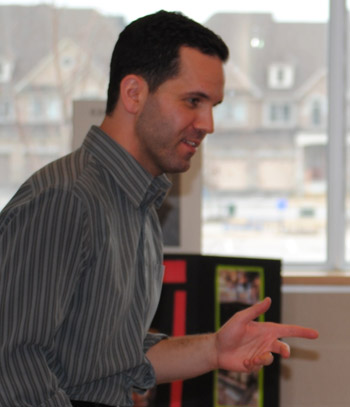TORONTO — The world-renowned TED organization, which promotes “ideas worth spreading,” has recognized a Jewish Toronto high school teacher for successfully implementing a revolutionary teaching approach in his classroom.
Jamie Cohen, a Grade 9 English teacher at the Anne and Max Tanenbaum Community Hebrew Academy of Toronto’s Vaughan campus, is one of three teachers – and the only Canadian – to win an international contest that challenged educators to create a SOLE, a self-organized learning environment.
The SOLE Challenge, created earlier this year by a U.K.-based educational technology professor who received $1 million in seed money from TED to create a virtual “School in the Cloud,” called on educators to create a learning environment that relies on the use of technology, collaboration and encouragement as the basis for 21st-century learning.
“It takes students on an intellectual journey to investigate the big questions,” 39-year-old Cohen said.
“What I like about SOLE is that I can structure the class so that hands-on learners, auditory learners, and visual learners are all stimulated and engaged.”
Cohen, who has a background in filmmaking and spent years in New York working for Saturday Night Live creator Lorne Michaels, said the contest appealed to him because of his interest in the way media can be used to teach universal lessons.
Cohen based his SOLE on a novel study of Hermann Hesse’s Siddhartha, which follows a young man on a spiritual journey of self-discovery during the time of the Gautama Buddha, in the 6th century BCE.
His students were asked to access a digital version of the novel on Rap Genius, a website that allows students to analyze, discuss and annotate the text line by line.
The students could post questions, make comments on the text, and expand on another student’s question or explanation of a passage, which encouraged collaborative online discussions.
“The students were asked to complete specific tasks, such as ask a question in an area you don’t understand, or find a visual link of what India looked like in that region,” Cohen explained.
The Rap Genius website also allows students to send questions directly to Cohen as they studied the chapters.
“Once they’d complete the tasks for each chapter… I would collect all the [students’] questions from Chapter 1, I would go to the tech room… and answer their questions on film. Instead of spending class time answering fact-based questions, I would answer the questions in front of a green screen, with the Taj Mahal in the background, and I would post the video that night and embed it into the online chapter,” Cohen explained.
“I did that for every chapter. I either answered the questions through video or a podcast.”
A SOLE is meant to encourage students to do their own investigation. Cohen said the teachers take on more of a facilitating role, rather than one that can be compared to “a guru on stage.”
A SOLE also allows students to benefit from international guest speakers through Skype or Google Chat.
“You don’t always need an expert in the room. In today’s world, you can talk to someone in Israel or India,” he said.
When Cohen first introduced his SOLE to his students last year, he was met with some resistance.
“This website, Rap Genius, is only two years old and it’s the big new thing in education, and I was one of the first to do this using a novel,” he said.
“I think at the beginning, it was so different, that one of my challenges was explaining why we were doing it this way,” he said.
But by the time they began studying the second chapter, both of his English classes, made up of 42 students, embraced the new learning technique.
His students were so enthusiastic about the new approach that by the end of the unit, they made more than 1,000 annotations to the virtual text.
For the second half of the novel study, students were put into groups of four and provided with samples of big questions (such as, “What is a leader?”) from the SOLE toolkit.
Each group was asked to come up with their own big question, investigate it using online resources and guidance from mentors, before discussing their findings with the other groups in the class.
Cohen said when he conducted a survey for the students who took part in the SOLE, about 90 per cent of the students said the new approach made the novel study less boring and more meaningful.
“The feedback was amazing,” he said, adding that his ultimate goal is to help change the way information is presented to students in a traditional school setting.
“I feel like the SOLE has revolutionized my approach in creating a student-driven, 21st-century learning environment that reaches all learning styles in class,” he said.
“I wanted to make this assignment so it wasn’t just about how students did in terms of their mark. I wanted it to be about learning for learning’s sake.”
Cohen and the other SOLE Challenge winners will be flown to New Orleans on Nov. 15 for the 2013 TED Youth Conference, where he will be presented with an award for his project.
